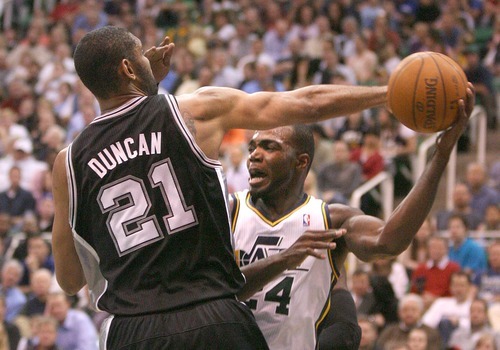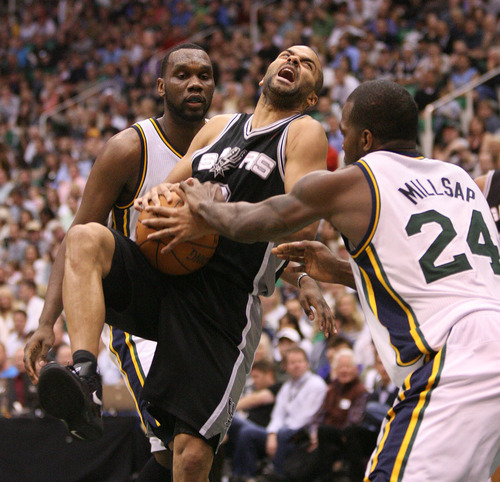This is an archived article that was published on sltrib.com in 2012, and information in the article may be outdated. It is provided only for personal research purposes and may not be reprinted.
After a regular season and postseason during which the Jazz were supposedly gaining experience and learning all kinds of lessons, it's time to turn to what we learned about the Jazz.
They have a promising future, if …
The youngsters — Derrick Favors, Gordon Hayward, Enes Kanter and Alec Burks — work hard to grow their games. Those four must continue to improve.
They can't shoot from the outside.
Never was that more evident than in Game 4, although after Game 3, Spurs coach Gregg Popovich noted that the Jazz "couldn't throw it in the ocean." But in the elimination match Monday night, the Jazz couldn't throw it in all the oceans combined, shooting 36 percent, making just 32 of 88 shots and posting the bagel - 0 of 13 - from behind the 3-point line.
The Jazz hoped they could get by with that deficiency, championing their layup-first attack. But many observers suspected that in the playoffs, going up against a quality opponent, the flaw would come up big. It did. It's a weakness Kevin O'Connor has to address this offseason, seeking a scorer who can keep defenses honest and relieve the burden on the interior offense.
Al Jefferson should be traded.
Some will look at Jefferson's stats and be wholly impressed by what the big man accomplished this season. Monday night alone, Jefferson scored 26 points on 13-for-19 shooting and pulled down 10 boards.
There is a huge downside, though, at both ends of the floor. On offense, when Al gets the ball, he holds it for too long, stagnating the Jazz attack. When a player does that, his teammates stop working and, even worse, they get bitter. Too often, Ty Corbin went to Jefferson and, too often, the negative effects went into effect.
Defensively, Jefferson is a liability. He's undersized at the 5 and cannot defend the pick-and-roll. The Spurs knew that and killed the Jazz on account of it. Other good opponents know the same thing.
Jefferson is a good guy, a nice man, but when he said after Game 3 that the Spurs were better than the Jazz, although it may have been true, it ticked off some of his more competitive teammates who didn't want a team leader to acquiesce that way in the throes of battle.
The Jazz must pay Jefferson $15 million next season if they keep him through the last year of his deal. The fact that he has an expiring contract makes him a more valuable asset to trade. One of the problems in moving him is that the 19-year-old Kanter is not yet ready to take over starter's minutes, although Kanter will eventually be an effective pick-and-pop shooter and a rugged defender.
They have redundancy at key spots.
Two of the team's best players, Paul Millsap and Favors, are both 4s. The developing Favors has to be the starter next year. If that's the case, in the last year of his contract, Millsap won't be happy. Much was made of the bigger lineup Corbin utilized here and there with Jefferson, Favors and Millsap on the floor together. It might have worked in select circumstances, but it's not the answer moving forward.
Though undersized, Millsap is highly regarded around the league, especially because of his relatively inexpensive current deal. He shows up, works hard, is a pro's pro. But he stands in the way of the Jazz's most promising rising star. He'll likely want a more expensive extension to stay with the Jazz, and they'll be hesitant to comply.
Hayward and Burks are both young shooting guards, although neither looked like much of shooter during a playoff series that saw them combine to go 0-for-15 in Game 4. Hayward can be much better, particularly if Corbin emphasizes his role. He is a rare commodity - a long, athletic guard who can score, pass and defend. Burks, coming off his rookie season, has still to show the breadth and depth of his skills. He has shown one thing: offensive aggression. He must add nuances to his game or he'll end up a career bench guy.
Corbin also has learning to do.
In the playoff series, Popovich was repeatedly a step ahead of Corbin, making him look overmatched throughout. It didn't hurt the Spurs coach that he had the fastest car on the track, but his good judgment made that car faster still.
Participating in his first postseason as a head coach, Corbin couldn't find adjustments that even started to slow San Antonio. The big-three lineup didn't work, starting Josh Howard didn't help, pounding the ball into Jefferson was too limited, not playing Favors enough was a bad decision.
Corbin will have to learn to communicate better with his players. There were disconnects with more than one of them this past season, and it's something for him to think about and improve. With a mix of veterans and youngsters, Corbin must make sound decisions and develop a deft touch in working with thoroughbreds, some of whom are high-strung, all of whom are extremely competitive and want some order in the way they are utilized.
They need a steady point guard.
It's fantasy, but think about how great Favors and Hayward would be if they had a set-up guy like Tony Parker or Steve Nash. Wow. What if they had half that guy? Devin Harris is not that half-guy.
O'Connor must make changes.
The Jazz will grow internally as young players improve, but that's far from enough. The front line has already been discussed, as has the lack of perimeter shooting and problems at the point, but the Jazz also are short a scoring wing player. Whether O'Connor, who has some flexible options, fills those holes by making a move to get in the high draft or via trade, we've learned this much: He can't sit tight and compete against the best teams in the West.
GORDON MONSON hosts the "Gordon Monson Show" weekdays from 2-6 p.m. on 97.5 FM/1280 AM The Zone. Twitter: @GordonMonson. —





